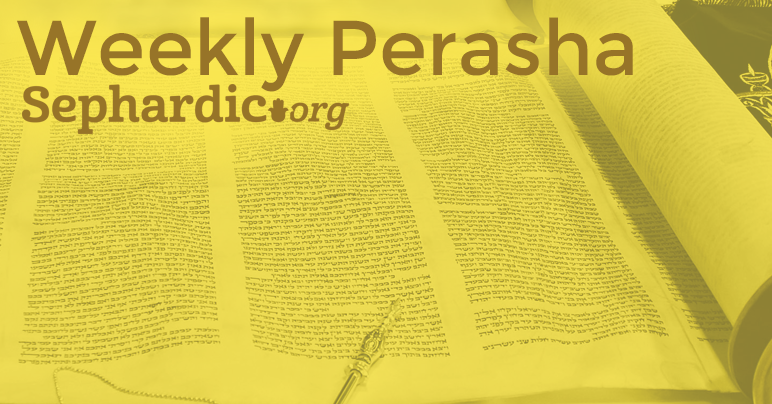
VAYIGASH - THE LENIENCY TO LEAVE THE LAND
We are taught of the special relationship that Yoseph had with his father in the beginning of Parashat Vayeshev. "Yisrael loved (had an affinity with) Yoseph more than all of his sons - because he was “ben zequnim” - literally a son of his old age. 1 The Ba’al HaTurim notes that ben zequnim should be translated as "his student of wisdom" - Namely the love was due to his father giving over the tradition consisting of the secrets of the Torah exclusively to Yoseph. 2 The Keli Yaqar adds that all of the other brothers refused to learn the Torah secrets that were transmitted to Yaakov at the Yeshiva of Shem and Ever - It was only Yoseph who desired to learn them from his father. 3 This solidified their spiritual love they had for one another. Hence it should not be considered strange if we are taught that Yoseph communicated his "being alive" via a Torah reference of the Misva of eglah arufa by sending Yaakov the wagons to carry him to Egypt. Furthermore we would like to assert that Yoseph also communicated to Yaakov that he acknowledged the existence of a spiritual force which controlled the sustenance in the world. This is hinted at in what the Torah describes Yoseph was sending to his father from Egypt - when it writes that he sent Yaakov “kazot”. We also hope to show that Yoseph was advising his father that the financial situation had been reduced to such an extent that Yaakov was now not only permitted to temporarily leave the land of Israel to obtain his sustenance - But he actually was allowed to permanently settle in a foreign land. The halakhic ruling was transmitted via the 300 silver coins given to Binyamin that were apparently loaded onto the ten male donkeys sent back to Yaakov.
YAAKOV'S FEAR TO LEAVE THE LAND
Rashi comments that after Yaakov had traveled and arrived in Be’er Sheva on his way to Misrayim he feared and was pained by the fact that he was being forced to leave the land of Israel. 4 In the Pirqe DeRibbi Eliezer, the Sages teach that when Yaakov heard that Yoseph was alive, he thought to himself, how could I leave the land of my ancestors, the land in which I was born and the land in which God resides? 5 If we assume that the Patriarchs had kept the entire Torah 6 - can we say that Yaakov was doubtful whether or not he was permitted to leave the land of Israel as is dictated in the Halakha? An approach that leads one towards leniency, admits that during the period of the Avot the land of Israel had been legally acquired by Israel - This was effectuated via a binding agreement in Berit Ben HaBetarim - and the traversing by Abraham across the length and breadth of the land. A question remains concerning the sanctity of the land at that time. We know that the land of Israel acquired "sanctity" via the conquest of Yehoshua - However according to the Rambam this sanctity was annulled via the Babylonian conquest. It was only with the return of Ezra that the land became consecrated permanently. 7 Accordingly one can assume that there was no hakakhic infraction to leave an apparently "un sanctified" land during the era of Yaakov! Based on this approach Yaakov and the brothers did not require to rely on one of the four leniencies to at least temporarily leave the land - namely to learn Torah, to marry, or save ones property from gentiles or for certain other business considerations. 8
PERMANENTLY LEAVING THE LAND - FINANCIAL DISTRESS
If we assume however that the land of Israel during the era of Yaakov was indeed endowed with halakhic sanctity -then it is clear that this would render it forbidden to leave. The above noted exceptions are only for a temporary leave - but after accomplishing the objectives - one would be required to return. If so - under what conditions were Yaakov and his family permitted to settle permanently outside of the land? The Rambam rules that this would only be permitted in the instance when a famine has reached a certain level of severity. 9 The Talmud details this as when inflation has reached a point when two se’ah of wheat costs a sela - which is double the normal value of four se’ah 10 - With this introduction we would like to share some novella cited by R. S. Donn. 11 Instead of merely enumerating the list of provisions and gifts which appear later in a verse in our parasha - the Torah notes that Yoseph sent his father kazot - literally "the same". 12 According to the Metuqim Midevash, Yoseph was admitting to his father that all hunger and its relief is in the hands of the Divine force hinted in the holy name Het Tav Khaf - which has a numerical value of 428 equaling that of Khaf Zayin Alef Tav - kazot - Know that amongst the meditations in the verse in ashre of poteah et yadekha which is associated and essential for sustenance - are the final letters of the first three words or Het Tav Khaf - (Parenthetically this force is associated with the not to be vocalized divine one called Diqarno”sa - responsible for sustenance in the worlds) 13 This name is numerically 431 or 428 + the 3 letters of Het Tav Khaf - So Yoseph's message is an admission that he is and was as the dispenser of food to the world - merely a vehicle to arouse this divine force. This numerical significance of the Torah's use of kazot - is mentioned by Rashi when he expounds this word to mean “according to this calculation” - Next Yoseph as the Torah student of Yaakov was going to hint to the latter that it was permitted to permanently leave a sanctified land of Israel - based upon the conditions of inflation set in Baba Batra. On the verse following the 300 coins he sent with Binyamin - Rashi notes that Yoseph had an exacting calculation in loading specifically the ten male donkeys - 14 According to the R. Elazar Moshe Horowitz - Yoseph was advising that it was specifically ten donkeys that would carry the 300 silver coins. 15 We know that 300 dinarim or silver coins equal 75 Sela’im 16. - . Secondly we know from the Talmud that a donkey can carry a letekh of wheat. 17 Which according to the Yerushalmi cited by Tosafot is equal to 15 Se’ah 18 - upon this the 10 donkeys could carry a total of 150 Se’ah - If at the time these 150 were valued at 75 sela’im - this would indicate that one sela can then only purchase two se’ah instead of the usual four se’ah - Hence Yoseph was communicating to his father that inflation was such that it was now indeed permitted to permanently leave the land of Israel even according to those who say that the land at the time had attained halakhic sanctity. This was Yoseph's exact calculation in sending the 300 silver coins via Binyamin.
BINYAMIN MADE THE CONNECTION
R. M. Alshikh surmises that the sum of 300 pieces of silver given to Binyamin might have been just compensation for having been framed and accused of theft of Yoseph’s silver goblet. 19 Halacha stipulates that if a Jewish master sells his slave to a gentile he may be assessed punitive damages - of up to ten times the 30 silver sheqel value equivalent of a slave. 20 Since at the time, Binyamin had been accused of being a thief - he would have been sold to Yoseph who had thought to be an Egyptian - and hence the compensation could be thought of as appropriate. Rabbenu Bahya suspects that the number 300 - is related to the indebtedness of the brothers. When the ten each sold a slave they each have to pay a 30 shekel ransom. 21 This is the value of the life of a slave that has been killed (gored by ox) and the compensation payable by his killer. 22 We mentioned that Yoseph as the primary student of his father communicated with the latter in terms of mystical considerations of the divine force as well as the possible halakhic leniency to leave Eres Yisrael. The fact that the 300 Dinarim were sent via Binyamin was likely due to his own affinity with Yaakov and Yoseph. According to the Zohar all three stand in sequence forming the central spiritual channel or Qav Ha’Emsa’i. While Yaakov and Yoseph represent Tiferet and Yesod respectively, Binyamin was related to the sub-channel of Yesod within the general channel of Malkhut. 23 We learned earlier that even Yehuda admitted that the soul of Binyamin was also integrated with Yaakov's as the verse notes “and his nefesh is connected to his (Binyamin’s) nefesh”. and he was termed a yeled zequnim qatan” - a term similarly used to describe Yoseph. 24 Furthermore the 300 silver coins would have to be sent with one that had not been tainted with sin - such as Binyamin as is testified a such an individual by the Talmud. 25 This is also apparent via the fact that he alone of all the brothers took no part in the sale of Yoseph.
HASHEM AGREES TO THE RULING
That Hashem agreed with the ruling of Yoseph to permit the emigration of Yaakov is apparent from the Midrash. Yaakov was uncertain if Hashem actually wished him to travel to Egypt -26 In fact he actually feared leaving without divine approval. 27 Another Midrash notes that we saw early on a permit to emigrate - as Hashem appears to him in a dream - "Yaakov Yaakov though I forbade your father Yishak to journey to Egypt - this was due to a special prohibition given to him 28 - you however are permitted to go." 29 For us however we must face our transgressions as admittedly we have no excuses to remain outside the land of Israel today which has permanently been invested with holiness. May we merit to adhere to the teaching of the Talmud - that at all times a person should dwell in the land of Israel, even in a city whose population is primarily gentile rather than dwell in the diaspora even in a city whose population is primarily Jewish. 30
Shabbat Shalom
Victor Bibi








